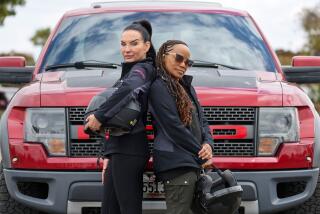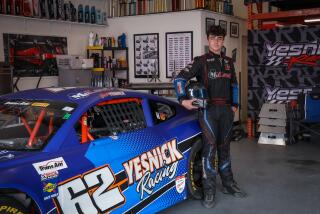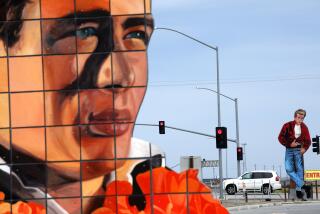How I Made It: Jason Chinnock once drove tanks. Now he drives Ducati’s U.S. operations
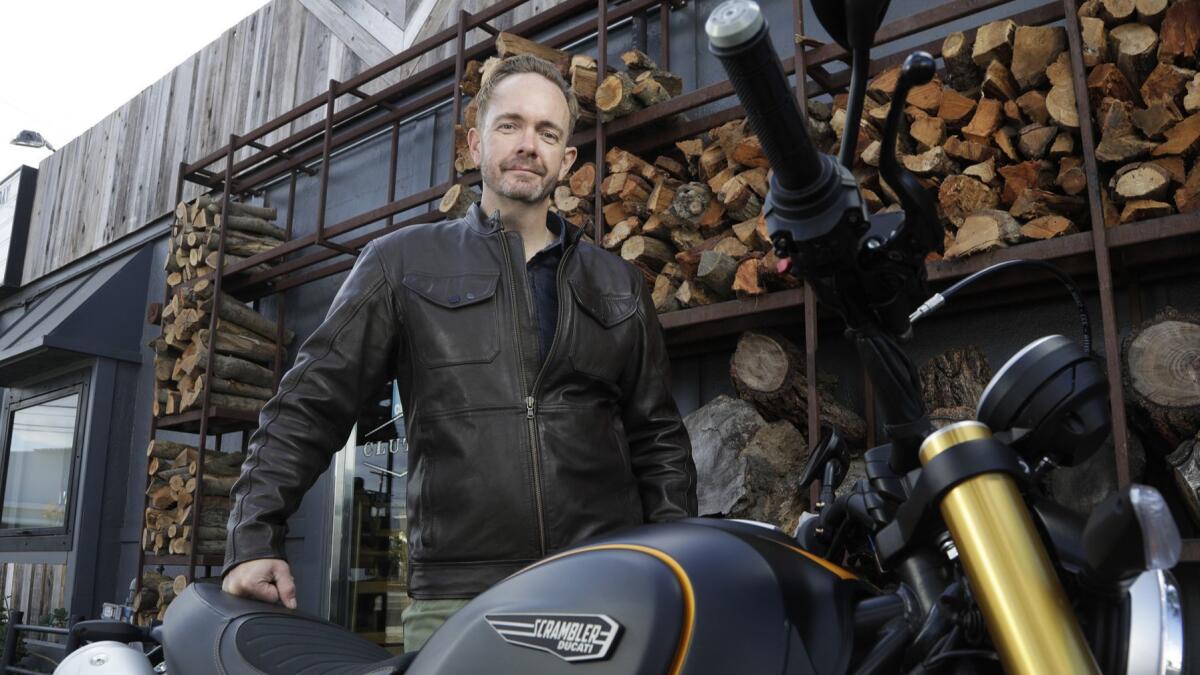
Jason Chinnock, the 47-year-old chief executive of Ducati North America, took a wildly circuitous route to one of the motorcycle industry’s most coveted corner offices, including stints as a touring rock musician, Desert Storm tank pilot and marketing director for Lamborghini.
For the record:
2:15 p.m. Oct. 21, 2018An earlier version of this story said that Jason Chinnock became chief executive of Ducati North America in 2014. He became CEO in 2016. The earlier version also misspelled the last name of Michael Lock as Locke.
Young rebel
One of two children raised in a conservative Christian home in Las Vegas, Chinnock was an energetic kid obsessed with skateboarding and BMX bicycling. He wasn’t a great student, and he wasn’t very good at following the rules. “If you told me not to do something, that made me want to do it,” Chinnock said.
Among the rules: No motorcycles. Chinnock rode his friends’ bikes, and he remembers his first crash: “After I hit a cinder-block wall, hard, I got up, dusted myself off, and said, ‘I want to do that again!’ The sense of adventure and risk were exhilarating.”
Fateful music
The family church featured regular musical performances. When his family hosted the drummer of a band visiting from Chicago, Chinnock saw his first career path open before him. “I thought musicians were so cool,” he said. Chinnock learned to play guitar and joined several rock bands, hoping to make music his main occupation.
His bandmates had other ideas. “My last year of high school I suddenly realized that all the friends I was in bands with had applied to college,” he recalled. “I thought we were going to live the dream! But they said they were going to get a life.”
Shifting gears
Chinnock’s mechanical engineer father and counselor mother couldn’t afford to send him to college, and he was afraid to take out student loans. So he did what looked like the next logical thing: Join the military, serve two years and then go to college on the GI Bill. Because combat-related specialties earned more credits toward college, he expressed an interest in armored units. “I tested high, so they gave me a choice. I chose Europe and tanks.”
Growing up
Chinnock was stationed in Germany when, on Aug. 2, 1990, the Army launched Operation Desert Shield, followed six months later by Operation Desert Storm. “A couple of guys said, ‘I didn’t sign up for this.’ Well, I didn’t either. But when I swore in, that’s the commitment I made. I had to follow through. That’s a moment where I think I grew up a little bit.”
Chinnock’s armored division was deployed to Iraq and saw combat, but he served without being wounded — on the outside. A roadside encounter with a little girl who’d been killed by a cluster bomb shook him up emotionally.
“Those were our bombs. We had done this stuff,” he said. “I realized I was not long for the military. I didn’t have the heart for it.”
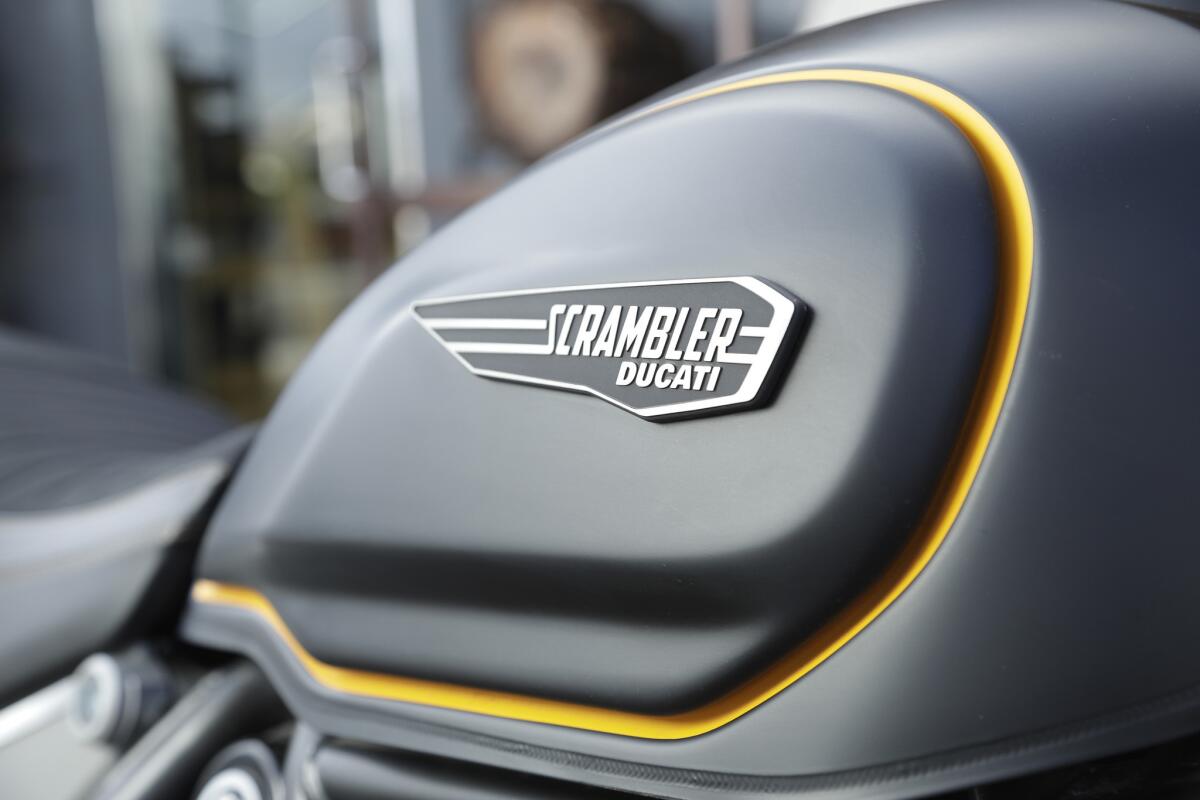
On the road again
After the Army, Chinnock enrolled at Colorado State University. He studied music and journalism, started a record label and formed a band, pursuing the old dream of making his living as a musician. He and his bandmates — including a “Spinal Tap”-style revolving series of drummers — toured the U.S. It wasn’t glamorous, and it wasn’t profitable. “We’d have to come home and work to make money to go back on the road,” Chinnock said.
Stubborn, Chinnock persevered for seven years. “I didn’t think I was going to be Paul McCartney, but I expected I could do what I loved to do and still pay the bills,” he said. “Then I realized that wasn’t going to happen.”
A new dream
Chinnock changed priorities. “I decided to make the thing I was passionate about, which was music, and make it a hobby, and take my hobby, which was motorcycling, and make it into a job,” he said. “So I went into my local motorcycle shop, where I bought all my parts, and said to the owner, ‘I want to get into this industry.’”
Chinnock got a $6-an-hour position as parts manager and spent his nights at home studying parts diagrams of Ducati, BMW and Moto Guzzi motorcycles. In three years, he’d risen to general manager and begun to form strong bonds with the U.S. representatives of European bike brands. When the motorcycle dealership was sold, Chinnock reached out to Michael Lock, then head of Ducati’s American operations, who brought him aboard in 2004.
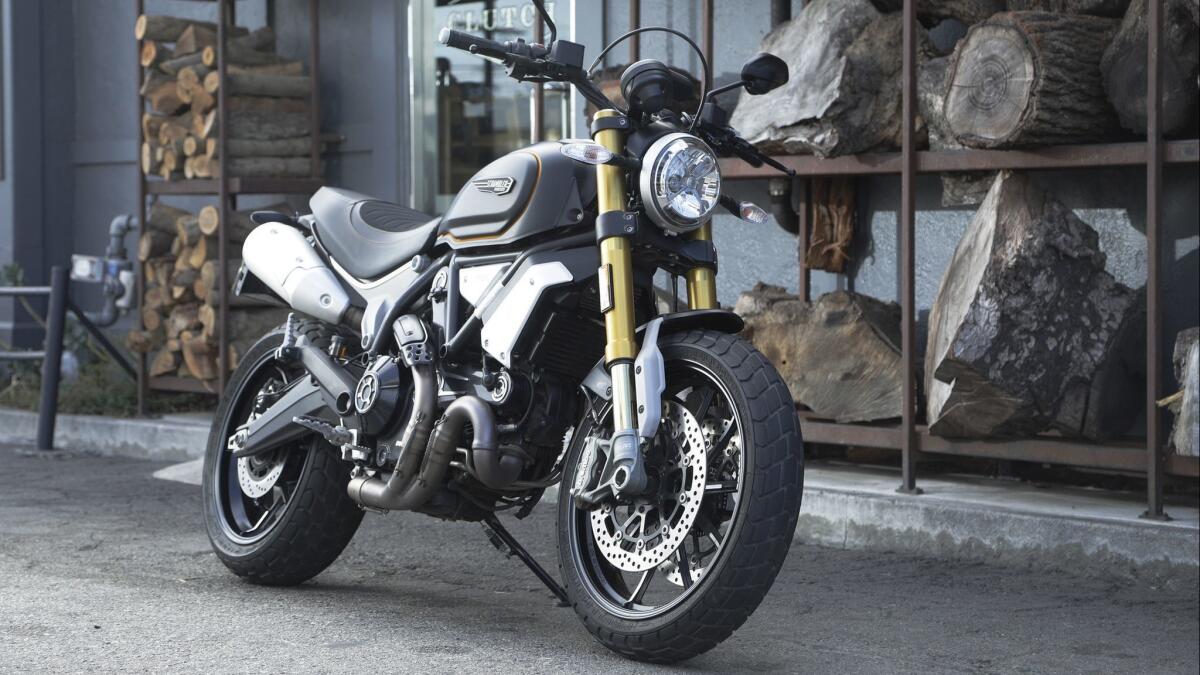
Ride to the top
Chinnock served as Ducati’s American regional sales representative before rising to national sales and marketing director. When Audi acquired the Italian brand in 2012, Chinnock moved to the Lamborghini brand to oversee its marketing and communications efforts in North America. In 2016, Chinnock moved back to Ducati, but this time as its American CEO. That put him in position to oversee the Scrambler — which quickly became Ducati’s top-selling bike after its 2014 rebirth and fueled a dramatic rise in U.S. sales.
As CEO, he employs lessons learned the hard way. “The biggest missteps I made came out of my background as an entrepreneur and a self-starter,” Chinnock said. “I tried to do it all myself and kept driving and driving until I was a slave to my own limitations. I had to learn to put the right people in place and coach them, and then trust them and follow them. I was always trying to lead from the front. Now my perception of leadership has changed.”
Lessons in mistakes
Chinnock encourages his people to make mistakes and learn lessons, as he did himself. “When I talk to my team, I tell them not to be afraid to make the mistake. Make it, learn from it and don’t make it again. That’s a big part of the ability to make decisions and move ahead quickly.”
The alternative, Chinnock believes, is a life of too much calculation and caution — safe but not perhaps as instructive. “I’d rather regret something I have done than regret something I haven’t done,” he said. “Every mistake I made helped me later.”
The next corner
Chinnock splits his time among Los Angeles, the Ducati factory in Bologna, Italy, and Ducati’s North American headquarters in Mountain View, Calif. As with many motorcycle industry executives, his idea of a good day off is a full day on a bike. In L.A., he carves canyons on the weekend with an eclectic group of riding buddies that might include one or two top names from the music industry. Or his father, who eventually also broke the family no-motorcycle rule. Last May, father and son rode together to the annual Quail Motorcycle Gathering in Carmel — astride Ducati Multistradas.
Chinnock tries to ride the way he tries to live, “like you don’t know what’s around the next corner.” That means staying alert, excited and prepared to give it 100%.
“Anything that’s worth doing is worth doing right, so you have to do your best or not do it at all,” Chinnock said. “Otherwise, what do you want on your tombstone? ‘Here’s someone who did pretty good’? I don’t want that. My tombstone should read, ‘If you don’t risk anything, you risk everything.’”
